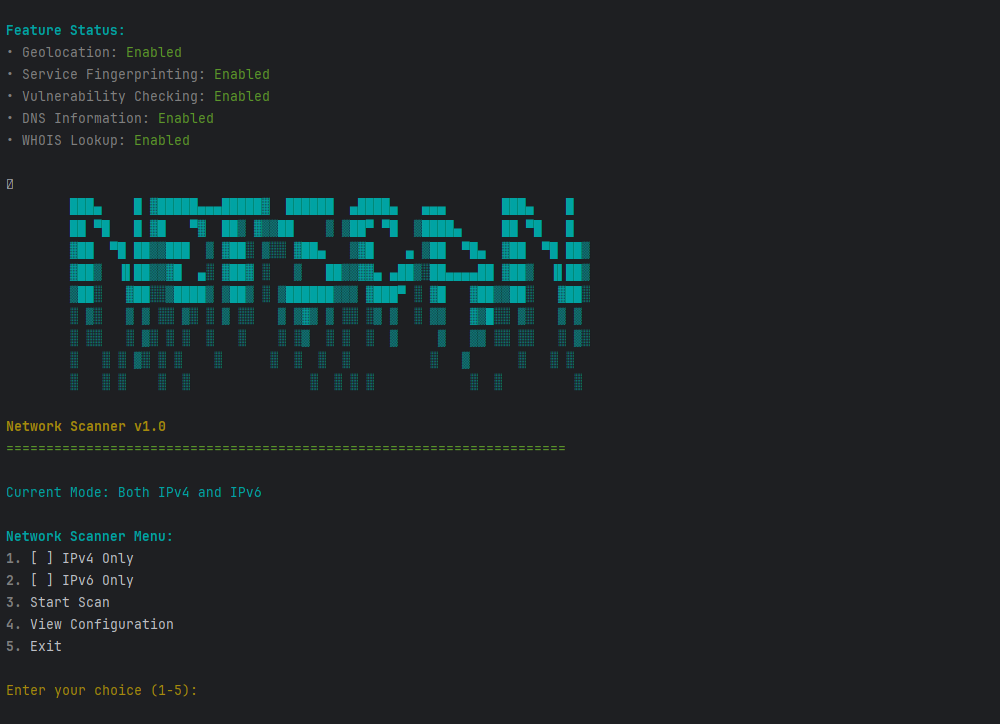Network Scanner
Python-based tool designed for network reconnaissance, service detection, and vulnerability analysis. It supports port scanning, service fingerprinting, web analysis, geolocation, and detailed reporting in both HTML and JSON formats.
Network Scanner Repository
Features
The Network Scanner is a powerful Python-based tool designed for network reconnaissance, service detection, and vulnerability analysis. Key features include:
- Port Scanning: Identify open ports and running services on both IPv4 and IPv6 addresses.
- Service Detection: Detect services like HTTP, SSH, FTP, and more using banners, extended probes, and SSL/TLS analysis.
- Web Analysis: Analyze websites for technologies, security headers, WAF detection, and potential vulnerabilities.
- Geolocation: Pinpoint the physical location of IP addresses using the GeoLite2 database.
- DNS Information: Retrieve DNS records (A, MX, TXT) and perform reverse DNS lookups.
- WHOIS Lookup: Fetch domain registration details.
- Reporting: Generate professional HTML and JSON reports with risk assessments.
- Customizable: Configure timeouts, concurrent scans, and reporting formats via
config.yml. - Cross-Platform: Works seamlessly on Windows, Linux, and macOS.
How It Works
The Network Scanner operates in several stages:
- Target Resolution:
- Resolves hostnames to both IPv4 and IPv6 addresses.
- Performs reverse DNS lookups and geolocation for resolved IPs.
- Port Scanning:
- Scans default or custom ports using asynchronous techniques for efficiency.
- Supports retries, timeouts, and rate limiting to ensure reliability.
- Service Detection:
- Identifies services running on open ports using banners, SSL/TLS information, and extended probes.
- Analyzes web services for technologies, security headers, and vulnerabilities.
- Reporting:
- Generates detailed HTML and JSON reports with scan results, risk assessments, and metadata.
- User Interaction:
- Provides an interactive menu for selecting scan modes, entering targets, and specifying custom ports.
Code Structure
The project is organized into modular components for maintainability and scalability:
network_scanner.py: Main entry point for the application. Handles user interaction and orchestrates the scanning process.utils/async_scanner.py: Implements asynchronous port scanning and service detection.utils/web_analyzer.py: Analyzes websites for technologies, vulnerabilities, and security headers.utils/reporter.py: Generates HTML and JSON reports based on scan results.utils/config_manager.py: Manages configuration loading and validation fromconfig.yml.utils/logger.py: Handles logging to both console and file outputs.templates/: Contains HTML and CSS templates for report generation.GeoLite2-City.mmdb: GeoIP database for geolocation features.config.yml: Configuration file for scanner settings.
Interface
Future Enhancements
The following features are planned for future releases:
- Enhanced Vulnerability Scanning: Integrate with CVE databases for real-time vulnerability checks.
- Authentication Support: Add support for scanning authenticated endpoints.
- Graphical User Interface (GUI): Develop a GUI for easier interaction.
- API Integration: Provide an API for integrating the scanner into other tools or workflows.
- Improved Reporting: Add PDF export and customizable report templates.
- Support for Additional Protocols: Extend support for protocols like SNMP, SIP, and more.
Ethical Considerations
The Network Scanner is intended for ethical use only. Users must adhere to the following guidelines:
- Authorization: Always obtain explicit permission before scanning networks or systems.
- Legal Compliance: Ensure compliance with local laws and regulations regarding network scanning.
- Responsible Use: Avoid using the tool for malicious purposes or unauthorized activities.
- Data Privacy: Handle any data collected during scans responsibly and securely.
By using this tool, you agree to abide by these ethical considerations and assume full responsibility for its usage.

